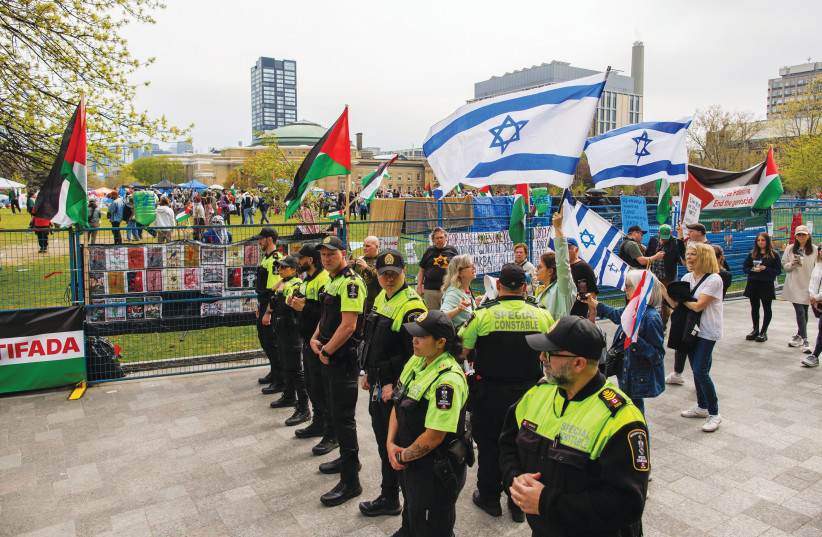As a university student, I recognize the importance of maintaining an environment that fosters inclusivity and safety for all individuals, regardless of race, religion, or gender. However, this has not been the case on campus since the violent acts of October 7, perpetrated in Israel by the terrorist organization Hamas. My people – the Jews in Israel and the Diaspora – have experienced targeted attacks in their homes and now face similar threats in what should be a space that promotes inclusivity and safety.
The article published by The Peak, a Simon Fraser University student publication, titled “See Palestine from children’s eyes,” stands as a stark reminder of the challenges Jewish students face in feeling welcomed on campus.
The language and tone of the article are antisemitic, spewing false narratives about the Jewish people, which directly affect students like myself, not only at Simon Fraser University but in schools around the world. The article’s approach is fundamentally flawed and profoundly harmful for several reasons: It misrepresents facts, uses antisemitic language, and lacks intellectual integrity and academic rigor.
Holocaust denial
This article does a fantastic job of diminishing the very existence of Holocaust survivors and tries to draw parallels between the incomparable. The Holocaust was a genocide that resulted in the murder of six million Jews. The genocide included the establishment of ghettos, forced labor camps, and extermination camps where mass killings were conducted using gas chambers and other cruel methods. The Nazi regime was orchestrated with the explicit intent of eradicating the Jewish people.
The Israeli-Palestinian conflict involves complex geopolitical, historical, and social factors. Since October 7, the war has been against Hamas, a recognized terrorist organization that has a charter explicitly calling for the destruction of Israel and the killing of Jews. Among unfounded claims of “carpet bombing,” the IDF sends soldiers into Gaza to rescue hostage – innocent Israeli civilians, one less than 9 months old, that continue to be held and abused by Hamas.
Neither the scale nor the nature of the conflict are comparable to the Holocaust and to compare them is offensive to the Jewish people. While the war has resulted in the unfortunate loss of life on both sides, Israel does not make an organized attempt to exterminate an entire ethnic or religious group. As a state actor, Israel follows international war laws and makes all attempts to prevent civilian casualties, such as warning Gazans to evacuate, thus announcing their plans to Hamas.

Furthermore, continuously referring to my family as “colonial-settler entities” without acknowledging the historical and cultural ties that the Jewish people have to the country of Israel, simply vilifies every Jewish person as a whole, wiping our very existence off the map as so many have tried before. The term “colonial-settler entities” refers to populations that establish a presence in a territory by displacing indigenous populations, often with the support of a colonial power. This usually involves the colonizers imposing their culture, governance, and economic systems while exploiting the land and resources for their benefit. This term is not only inaccurate; it is extremely harmful to the Jewish nation. The Jewish connection to the land of Israel is ancient, dating back over 3,000 years.
Truly understanding Zionism
Modern Zionism, the movement for Jewish self-determination, arose in the late 19th century as a response to widespread antisemitism and persecution in Europe and Russia. It sought the re-establishment of a Jewish homeland. Zionism is perfectly described by Zach Beauchamp: “The Jews deserve their state in the same way the French people deserve France or the Chinese people should have China.”
Israel is a diverse state home to Jews from various backgrounds, including Arabs, Druze, Bedouin, and other minority groups. Arab citizens of Israel have the right to vote, run for office, and enjoy equal rights under the law.
The article from the student publication cherry-picks information, ignores opposing viewpoints, and presents a biased narrative that fits a specific ideological agenda. Misinformation, antisemitic rhetoric, and the distortion of historical and geopolitical realities in The Peaks student article are misleading and violate academic integrity and intellectual honesty. Such publications prevent genuine understanding, promote hostility, and hinder meaningful discussions.
As students, we must challenge falsehoods, confront bigotry, and strive for more empathetic and truthful discussions on such complex issues. Publications that reinforce negative stereotypes and downplay the historical suffering of the Jewish people contribute to a hostile environment on campus. These narratives make Jewish students feel unwelcome and threatened.
The writer is a student at Toronto Metropolitan University and a campus media fellow with Allied Voices for Israel and HonestReporting Canada.
